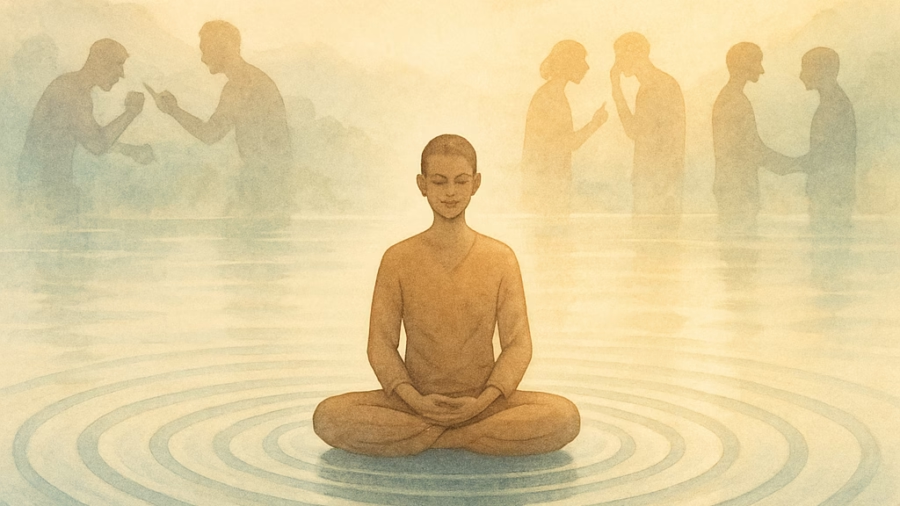How Spiritual Well-being and Mindfulness Reshape Our Responses to Rudeness
Have you ever found yourself in a situation where a simple, rude comment from a stranger completely derailed your day? You were in a good mood, but their sharp tone or thoughtless action turned your calm into frustration and anger. You might have even found yourself lashing out in return, only to regret it later. If this sounds familiar, you are not alone. Many people feel as though the world is becoming a less civil place, a sentiment supported by surveys showing a widespread belief that rudeness is on the rise.
What is really behind this? According to a new study, it is not just that people are inherently rude; it is a self-perpetuating cycle known as the Principle of Impoliteness Reciprocity (PIR). This concept suggests a “tit-for-tat” pattern in our interactions, where a rude act provokes a rude counter-act. It is an almost instinctual desire to get even—to make the other person feel the same way we do. Things can escalate quickly, especially in face-to-face situations, where the urge to “settle the score” can take over. The good news is, we have the power to break this chain. The solution is not found in controlling the behaviour of others, but in cultivating a strong inner foundation that allows us to respond with peace instead of reaction.
The Four Pillars of Behavioural Change
Changing our behavioural patterns is not about willpower alone. It is about nurturing our entire being—mind, body, and spirit. By focusing on spiritual well-being, meditation, exercise, and mindful socializing, we can build the resilience needed to face life’s frustrations and respond with grace.
1. Spiritual Well-being: Finding Your Inner Compass
Spiritual well-being is not limited to a specific religion or belief system. It is about finding a sense of purpose, meaning, and connection in life. When you feel grounded by a deeper sense of self, it’s easier to see the bigger picture and not take every small affront personally. This inner peace acts as a buffer against the negativity of others. You might realize that the person who cut you off in traffic is late for an emergency, or the cashier who snapped at you is simply having a difficult day. This practice allows you to respond with compassion rather than with the knee-jerk aggression that fuels the cycle of rudeness. It helps you see the other person as a human being, not just a source of frustration, and shifts your focus from a transactional “debit” of impoliteness to a compassionate exchange.
2. Meditation: The Pause Between Stimulus and Response
One of the most powerful tools for breaking the PIR cycle is meditation. When you practice meditation, you are training your brain to create space between an external event (like a rude comment) and your internal reaction. The study mentioned earlier found that in face-to-face interactions, impoliteness escalates in a stepwise manner, with each step taking slightly longer than the one before. Meditation directly counters this by slowing down your mind’s impulsive rush to judgment. Instead of reacting with an immediate burst of fury, you learn to pause, observe your emotions without judgment, and then choose a different response. This simple act of creating a conscious moment of reflection is a game-changer. It allows you to step off the track of escalation before it even begins.
3. Exercise: Moving the Body, Calming the Mind
The connection between physical activity and mental clarity is undeniable. Regular exercise is a potent stress reducer, releasing endorphins that improve your mood and overall sense of well-being. A physically active person is often more resilient and less prone to reacting negatively to minor irritations. When you are not stressed, your nervous system is in a state of calm, making you less likely to perceive a situation as a threat. Think about it: when you feel good and your body is at ease, a rude person’s behaviour feels less like a personal attack and more like a passing annoyance. Exercise helps you build a physical and mental buffer that allows you to handle life’s small frustrations with a stronger, calmer demeanour.
4. Mindful Socializing: Conscious Connection in a Digital World
While online anonymity can sometimes feel like a shield for rude behaviour, the truth is that rudeness occurs in all settings. Mindful socializing means engaging with others, both in person and online, with full presence and intention. This practice is about being the change you want to see. Instead of participating in a sarcastic online comment thread, you can choose to step back. In a face-to-face conversation, you can practice active listening and empathetic responses, consciously breaking the cycle. By choosing not to engage in a “settling of scores” and instead responding with grace, you become the third party who mediates the situation, as seen in the study’s online findings. Even in a heated moment, a calm, polite response can completely disarm the other person, diffuse the tension, and create a happier, more fulfilling interaction.
A Step Towards a Kinder World
While it may seem that rudeness is everywhere, it is important to remember that we have control over our own behaviour. The world is made up of individual interactions, and each time you choose to respond with peace instead of provocation, you contribute to a more positive environment. By prioritizing your spiritual well-being, practicing meditation, staying active, and engaging in mindful socializing, you can rewire your own behavioural patterns and break the cycle of rudeness, one polite step at a time.

